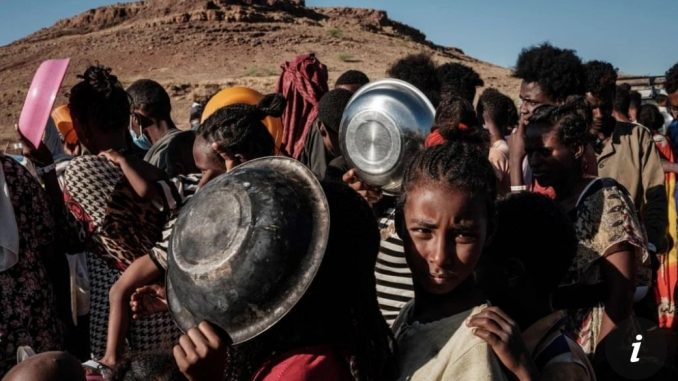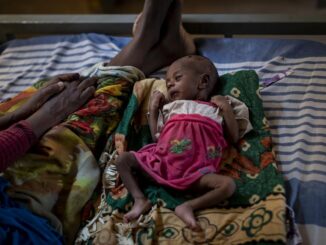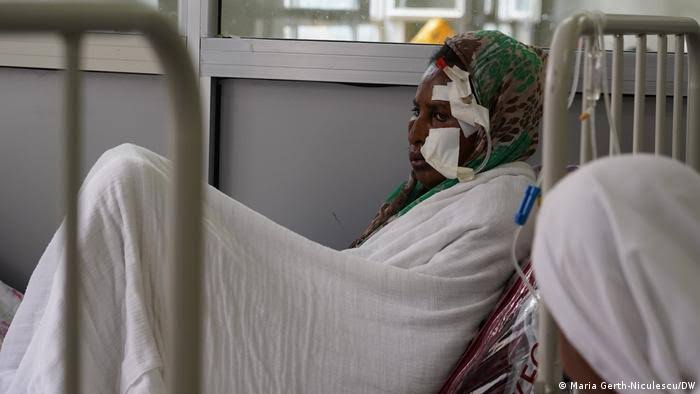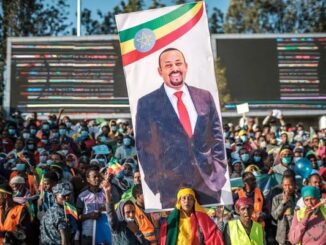
As the war enters its fifth month in Ethiopia, millions of displaced people in the northern region of Tigray are now facing a further hunger crisis. Violence has interrupted the main food supply routes and farms have been destroyed. Many have lost their income and prices have increased for the little food still available to buy. Pressure is now mounting on the country’s Nobel peace prize-winning Prime Minister to supply aid to the starving. Millions of people in Ethiopia’s northern Tigray region are facing starvation. Until now, it’s been a crisis without pictures, report says:
Those wrenching images of emaciated children and mothers with dull-eyed gazes, so sadly familiar from famine zones, have yet to emerge. But that’s because journalists aren’t permitted to travel to the worst-hit areas of Tigray, where hunger is deepening by the day. When the media can finally get access, or when starving villagers abandon their homes and flee to towns, the pictures will surely remind viewers of drought victims from Ethiopia’s 1984 famine, which prompted the famous LiveAid benefit concert and a vast outpouring of charity.
Now, though, there is no drought and no harvest failure. Tigrayans are hungry today because starvation is being used as a weapon of war—relentlessly and systematically.
The United Nations estimates that 4.5 million people in Tigray are in need of food assistance—80 percent of the region’s population. The Famine Early Warning Systems Network, a global hunger monitor established in the mid-1980s with funding from the U.S. Agency for International Development, puts Tigray in “emergency” status—one step short of a declaration of famine, with death rates on the rise. Accurate data from the region is hard to come by, but a reasonable guess is that 100 children are dying each day.
In a published report, the World Peace Foundation explains the reasons to fear the situation could get even worse.
Fighting broke out in Tigray on Nov. 3, following months of escalating tensions between the Tigray People’s Liberation Front—the region’s ruling party, which led Ethiopia’s ruling coalition from 1991 until 2018—and Prime Minister Abiy Ahmed. After accusing the TPLF of orchestrating an attack on a federal military camp, Abiy ordered an invasion of the region, promising a swift “law enforcement operation” to capture the renegade Tigrayan leadership.
The World Politics Review in its report said, within days, militias from the neighboring Amhara region had joined the fray, followed by the army of neighboring Eritrea, a longtime rival of Tigray. Ethiopian federal forces took the regional capital, Mekelle, in late November, but more than four months later, the fighting still rages, with most of the Tigrayan leadership still at large, mobilizing a guerrilla army and broadcasting its defiance from mountain hideouts.
Human rights organizations have documented massacres of civilians, virtually all of them committed by Ethiopian federal forces and Eritrean troops. The most up-to-date compilation of confirmed killings, produced by Belgian and Ethiopian researchers, includes 150 incidents in which five or more civilians were killed in one place at one time. Journalists have interviewed numerous survivors who say they were raped. U.S. Secretary of State Antony Blinken has described the campaign in western Tigray, where forces from Amhara and Eritrea are most active, as “ethnic cleansing.”
ALSO READ: Sexual violence pervades Ethiopia’s Tigray war — Raped victims speak out
Regardless of who started the war and why, these are all violations of international humanitarian law—that is, war crimes. If they are deemed widespread, systematic and perpetrated by a state or organized rebel army, they qualify as crimes against humanity.
In today’s report, the World Peace Foundation documents another war crime in Tigray: the use of starvation as a weapon of combat. The legal definition of this crime, as codified in the Rome Statute of the International Criminal Court, is destroying, stealing or rendering useless “objects indispensable to the survival” of civilians—language that is also found in the Geneva Conventions. The concept of starvation as a war crime is evolving fast as international jurists pay more attention to it. Beyond depriving civilians of food, it also includes destroying or denying them access to crops and farm animals, water and water infrastructure, medical facilities and—though this has yet to be tested in court—access to markets and employment opportunities.
In Tigray, all of these things have been targeted. There are scores of confirmed accounts of Eritrean and Ethiopian troops stealing and destroying food. They have slaughtered farm animals from plow oxen to poultry. One eyewitness we spoke to described an act of petty but mindless deprivation: an Eritrean soldier crushed baby chicks under his foot.
The aid group Doctors without Borders reported in mid-March that of the 106 health facilities in Tigray that it had visited, “70 percent had been looted and more than 30 percent had been damaged. Only 13 percent were functioning normally.” Water supply systems have been ripped out and household items from fridges to faucets looted.
The campaign of deprivation goes beyond immediate needs. It is sending Tigray back to a stone-age economy in which people are forced to live hand-to-mouth and depend on charity.
Tigrayans are hungry today because starvation is being used as a weapon of war—relentlessly and systematically.
Farmers in Tigray’s rocky highlands have long struggled to grow enough food to feed their families, so poor villagers have also depended on seasonal work in more fertile areas, such as lowland western Tigray—now occupied by Amhara militias and de facto annexed to the Amhara region. Rural people also need to travel to towns for informal work and to go to the market, but that has become dangerous. Two weeks ago, staff members from Doctors Without Borders witnessed soldiers pulling young men off a vehicle and executing at least four of them. Women and girls are also at risk of sexual abuse by soldiers on patrol or at checkpoints.
Aid agencies estimate that 900,000 people have been forcibly displaced. Countless more are unable to flee or are forcibly immobilized—and are growing increasingly desperate.
After the famine of the 1980s, the Ethiopian government and international donors poured resources and expertise into ensuring that such a calamity would never happen again. In fact, the most important achievements of the TPLF’s decades in power were cutting the poverty rate in half, reducing child mortality by 70 percent, and bringing in a suite of measures to mitigate the impacts of droughts.
When the harvest failed in 2015, Ethiopia mobilized a rapid and effective response. Its flagship Productive Safety Net Program—supported by USAID, the World Bank and European donors, as well as Ethiopia’s own resources—allowed 6.6 million beneficiaries to stay on their farms, working, and not be forced to sell important assets like livestock or miss the planting season. The program has just been renewed for five years, but it is not operational in the conflict-hit areas of Tigray.
Across the region, around 450,000 farmers—40 percent of rural families—had savings in local microfinance institutions. Those accounts have all been frozen by the government. We spoke to an eyewitness in one town who described soldiers using jackhammers and crowbars to pry open the safe at a local microfinance office.
Factories in Tigray once employed 45,000 people, producing a range of products, including garments, flour, pharmaceuticals, marble and consumer goods. According to the evidence in the World Peace Foundation’s report, every single one has been pillaged, and what couldn’t be taken away has been burned. Hotels that once thrived from a steady flow of tourists have been stripped bare. Even the kiosks used by shoeshine boys have been smashed, their brushes and polish stolen.
Tigrayan farmers are tough and resilient. Rather than flocking to towns looking for charity, most are hiding in the hills, hoping to return to their farms when the rains come so they can plant for the next harvest. If they can’t do that, the food crisis will continue—and worsen—over the next 18 months. The rains come in June, but the land needs to be prepared in May. Time is short.
Today, all the warring parties are putting military and political calculations ahead of humanitarian ones. The Ethiopian government is mobilizing new divisions in hopes of dealing a decisive blow against the TPLF, while Amhara forces are planning to officially annex the Tigrayan lands they have overrun. The TPLF’s leaders, meanwhile, are promising to outlast their enemies and turn the tide of the war.
The United Nations and humanitarian agencies in Tigray face a tough dilemma. Their permits to travel and work are issued by the Ethiopian government, which wants to keep the conflict out of the news. Local journalists have been harassed and even killed, and the translators and fixers who make it possible for international journalists to work have also been intimidated. The message to aid workers is clear: stay silent. For humanitarians, charity comes first; exposing human rights violations must wait.
Blinken has presented Abiy’s government with four demands: the withdrawal of Eritrean troops from Tigray; a cease-fire leading to political negotiations; unimpeded humanitarian access to all in need; and an independent investigation of atrocities. It’s a strong list, but Abiy is only doing the bare minimum. On March 26, he said Eritrean forces would withdraw from the region, but without specifying a timeline. Signs from Ethiopia indicate that his top priority is to finish the military campaign.
However, a cessation of hostilities is needed now, before Tigray plunges into a terrible famine.
The U.N. Security Council discussed the Tigray crisis last month, but could not reach agreement on a resolution. Russia, China and India all lined up behind Ethiopia to insist that the conflict is an internal affair that shouldn’t be of international concern. That avenue is blocked for now.
This week, Ethiopia is asking for debt relief at the spring meetings of the World Bank and International Monetary Fund, in Washington. This is where the U.S. and its partners can exert direct financial pressure. After all, these international financial institutions are mandated to help countries reduce poverty and build infrastructure—not fund a government that is doing precisely the reverse. The world must hold Ethiopia accountable for its starvation crimes.
Alex de Waal is executive director of the World Peace Foundation and a research professor at the Fletcher School at Tufts University.




